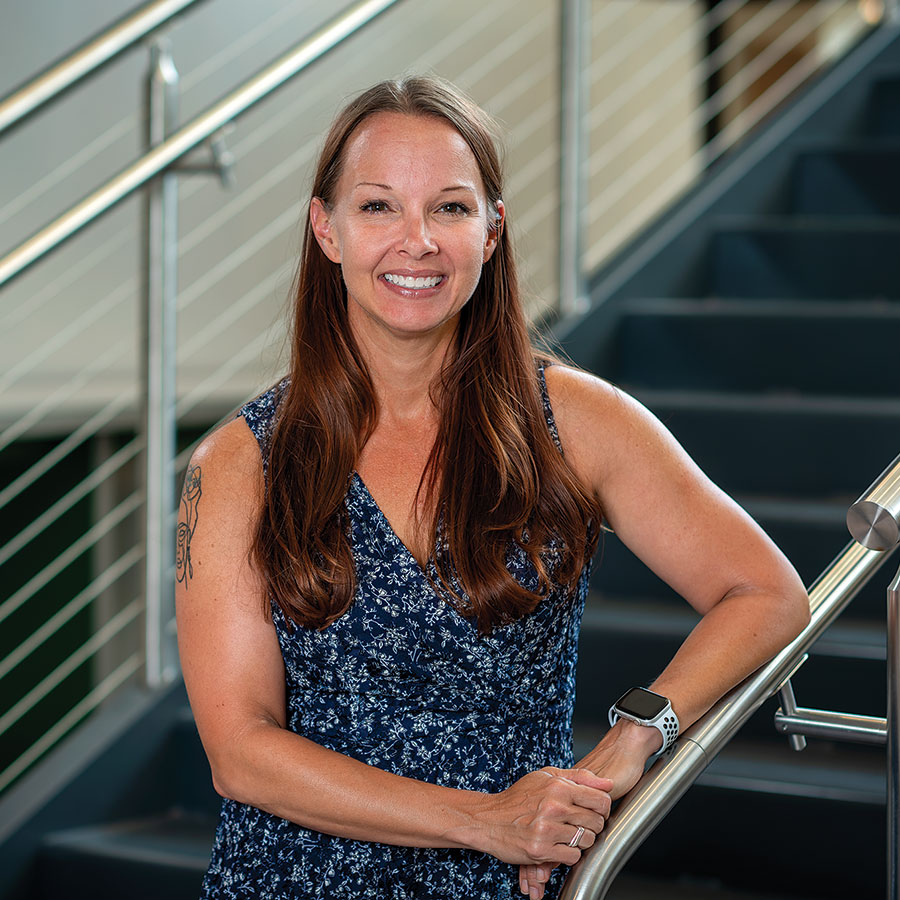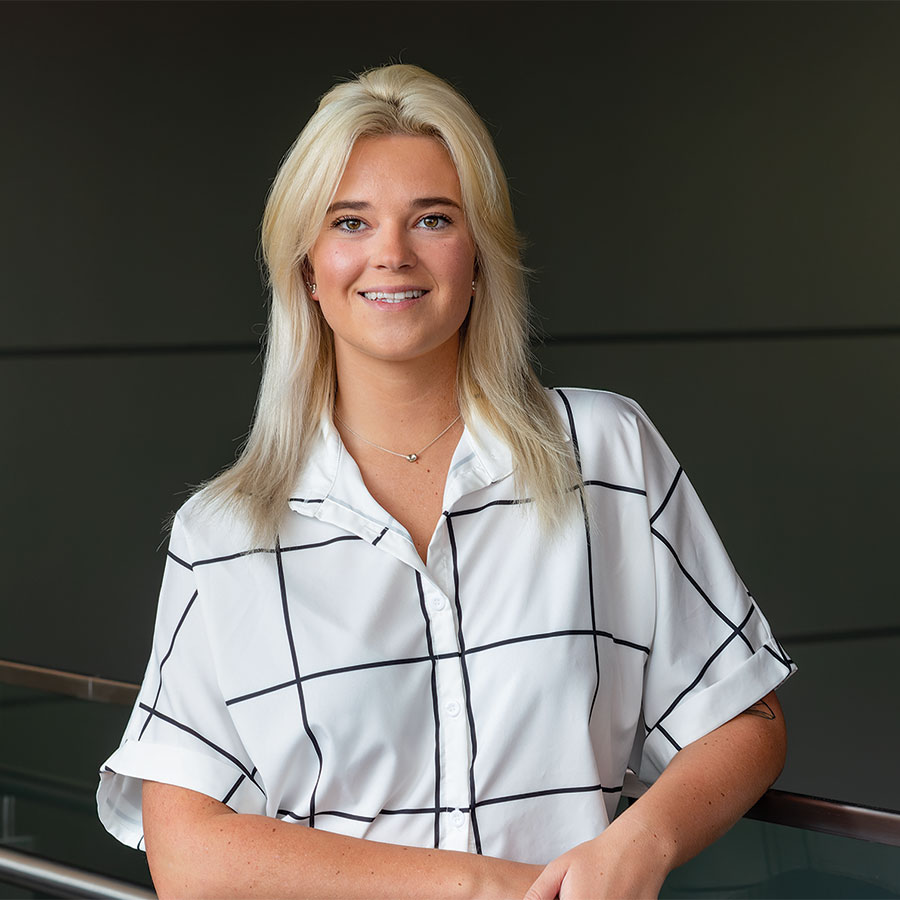rissi Oden ('05, '10 M.F.A.) burrowed deeper into the covers of her gurney, a fruitless attempt to ward off the bone-deep chill of the pre-op holding area. An orderly brought her one pair of fuzzy socks. She wished he'd brought six.
Literal Lifesavers
Through living kidney donation, three alumni give the ultimate gift.
Photography by: Michael Clements
September 24, 2021
K

Krissi Oden ('05, '10 M.F.A.) donated a kidney to her stepdaughter, Trinity, three
years ago.
But just because she had cold feet didn't mean she had cold feet. If anything, Oden was excited. For the past six months, the art history alum had undergone a battery of physical and psychiatric tests. At her doctor's suggestion, she'd abandoned her high-protein diet and weightlifting routine to lower her creatinine levels. And then, finally, the green light: She was given the go-ahead to donate a kidney to her 17-year-old stepdaughter, Trinity.
Just a month before the scheduled operation, Oden and her husband, Troy, traveled with Trinity and her three younger siblings to Greece for a Make a Wish trip. It was Trinity's dream to see turtles swim in the Mediterranean, and thoughts of the upcoming surgery were assuaged by seaside solace.
But now, reality had arrived. For the first time since Trinity had been diagnosed with Stage IV kidney disease in middle school, Troy cried. Oden, though, was eerily calm.
"You know when you need to do something because it's the right thing to do -- you don't even think twice about it," says Oden, who serves as the first-ever cultural arts manager for the City of Bedford. "It's my job to step up."
If it weren't for Oden -- and other alumni who comprise UNT's caring community -- there might not have been many alternatives. In 2020, there were more than 91,000 individuals in the U.S. waiting on a kidney but fewer than 23,000 donations, according to organdonor.gov. As of 2021, 83% of patients on the national organ transplant waiting list need a kidney.
"We want to increase the knowledge that living donation is an option," says Jennifer Nixon ('11) a transplant social worker at UT Southwestern Medical Center who provides pre- and post-op support to kidney recipients and living donors. She often connects donors to services such as the National Living Donor Assistance Center, which can help with travel, lost wages or dependent care expenses during recovery. "For anyone who is curious about the process, there's a wealth of information on the websites of centers that do living donation."
'It's a rush'

Mollie Ferguson ('19) took part in altruistic kidney donation, meaning the recipient
was unknown.
It was one of those very websites that convinced Mollie Ferguson ('19) to move forward with becoming a donor. Back in 2019, Ferguson's mother told her of an acquaintance whose father needed a kidney, but the son wasn't a match.
"He wasn't high on the transplant list because of his age," says Ferguson, a logistics and supply chain management alum and analyst at BNSF Railway who also is a living donor ambassador for the United Network for Organ Sharing. "It sounded like they really needed help."
Their story prompted Ferguson to look into altruistic transplant opportunities at Medical City Fort Worth -- "I was 20, and didn't even know at the time you could just donate a kidney to anyone," she says. After researching the process, Ferguson applied. The hospital called the next day.
She underwent the required evaluations and spent time at the transplant center to learn more about what to expect. On Aug. 20, 2019, Ferguson was wheeled into surgery, where she donated a kidney to a patient she had never, and still hasn't, met.
"Knowing that someone's health will be better just because of this one decision I made, it's a rush," says Ferguson, who spent only one night in the hospital and was back in class less than a week later. Nearly two years after her surgery, she's also signed up to be a bone marrow and liver donor. "There are nearly 100,000 people waiting for a kidney -- it's amazing to me that we can't dwindle that number down."
'These surgeries are lifesaving'

NBC 5 anchor/reporter Kristi Nelson ('94) is what her mom calls "my daughter, and
my donor."
More than a decade after her kidney donation, Kristi Nelson ('94) still fields questions from concerned viewers.
"Just a couple of months ago, one sent me a message on Facebook saying, 'I remember you gave a kidney to your mother -- how are you both doing?'" says Nelson, a news anchor/reporter for Dallas' NBC 5 who filmed an Emmy-winning series about the donation called "Kristi's Gift." "A lot of people remember it."
At the time, Nelson's mother -- a Type 2 diabetic -- was undergoing dialysis and worried about her odds if she were placed on the transplant waiting list. The process would likely move much faster if a family member or friend was a match, but Nelson was careful not to jump into the decision too quickly, taking the time to ask questions of medical professionals and reaching out to other living donors.
"If you want to help but you're worried, just make sure you're healthy enough to do it," Nelson says. "And think about how you're going to feel later, whether you donate or you don't. Which outcome would make you the happiest?"
Ultimately, Nelson became Baylor Health's 798th living kidney donor -- and, more importantly, she's what her mother proudly calls "my daughter, and my donor." Nelson not only shared her personal story with the NBC 5 audience, but continues to raise awareness as a board member of the Southwest Transplant Alliance, an organization that facilitates transplants in Texas. Kidney donation is particularly important in the Black community, she says, where diabetes and high blood pressure are prevalent.
"These surgeries are lifesaving," Nelson says. "There's a need, and living donors play an important role in satisfying that need."
'An amazing gift to give'
The second Oden was able to walk, she trekked through the breezeway that connects UT Southwestern to Children's Medical Center. She couldn't believe the difference, she says -- the color already was back in Trinity's cheeks, and she looked healthier than she had in years.
"I just started crying," says Oden who, three years after the surgery, says her life remains "completely normal." For Mother's Day, Trinity wrote a message on her Facebook wall: I'm in constant awe of your compassion and love, it read.
Their story, though, didn't have the intended happy ending -- nearly a year after the surgery, Trinity's body rejected the kidney, and she's back on the waiting list. But Oden says she's never regretted the decision to donate. She'd do it again if she could.
"It's an amazing gift to give, and if you have the chance to do it, you should," she says. "There are a lot of what ifs, but the main one is: What if you don't?"